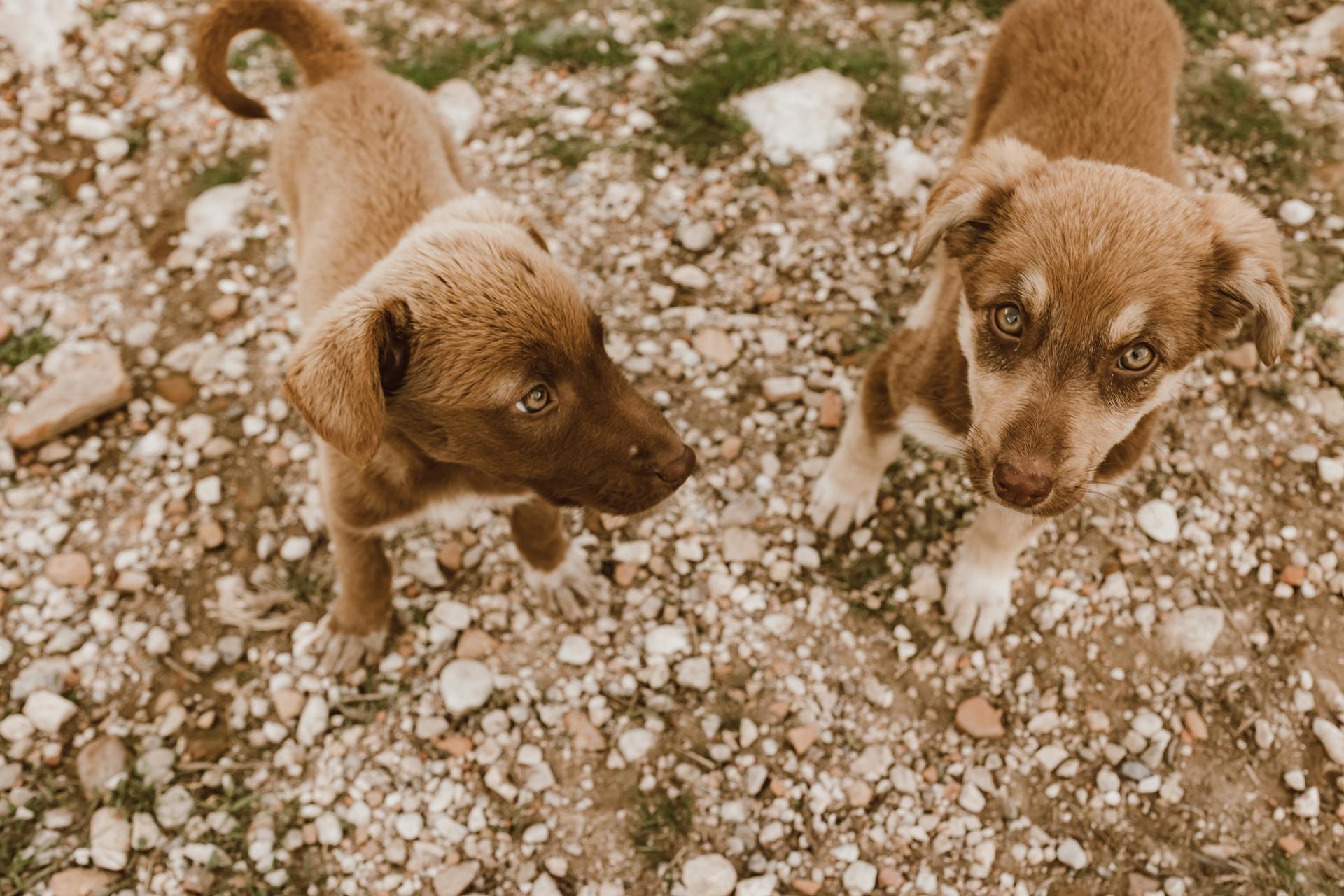
Yorkie Terrier puppies are a bundle of energy and joy, but they can also be a handful if you're not prepared. They require regular exercise, which can range from 10 to 15 minutes per day.
To ensure your Yorkie Terrier puppy gets the right amount of exercise, consider taking them on short walks and playtime sessions throughout the day. This can include playing fetch or simply running around in a securely fenced area.
Yorkie Terrier puppies are also known to be intelligent and curious, which means they can get into mischief if left unattended. Keeping an eye on them at all times, especially during the first few months, is crucial to preventing unwanted behavior.
With proper care and attention, Yorkie Terrier puppies can grow into happy and healthy adult dogs.
Temperament and Personality
Yorkshire Terrier puppies are bold and brash, just like their terrier roots. They're high-energy and playful, and can even be feisty at times, especially around strange dogs.
Their small size belies their oversized personality, and they often think of themselves as much larger than they are. This can lead to some confidence issues, but it also makes them great companions.
Yorkies are naturally affectionate and can make great lapdogs, but they do require sufficient exercise to keep them happy and healthy. Without enough physical and mental stimulation, they can become excessive barkers.
Some Yorkies are gentle with children and other pets, but adult supervision is always necessary when they're around kids or other animals. This is especially important with little Yorkies, who can accidentally be hurt when playing.
With patience and training, Yorkies can learn to be quiet and well-behaved, making them ideal companions for apartment living. They just need plenty of mental stimulation and chances to play to keep them happy and engaged.
Related reading: Yorkies and Chihuahuas
Caring for a
Yorkie terrier puppies are a handful, but with the right care, they can thrive. They need daily walks, which can be as simple as a stroll around the block or a play session in a fenced yard.
Yorkies are high-energy dogs and need mental stimulation to prevent boredom. They enjoy playing games and chasing balls, but be prepared for them not to return the ball.
Their long coats require daily brushing or combing to prevent tangles and mats. If you're not up for the task, you can consider a short Yorkie haircut.
Yorkies aren't built for cold weather, so make sure to protect them with dog coats or stylish sweaters. They also don't tolerate heat well, so keep them indoors during the hottest parts of the day.
Their small size makes them vulnerable to larger dogs and wild predators, so be vigilant about removing any household hazards. Keep heavy items out of reach, and make sure they can't escape.
Yorkie puppies need regular trims to prevent their coat from dragging on the ground. They also need regular baths every week or two, and nail trims every month. Don't forget to brush their teeth daily with dog toothpaste to prevent dental problems.
Health and Nutrition
Yorkie terrier puppies require a balanced diet to thrive. Healthy Yorkshire Terrier dogs should receive all necessary nutrients from their AAFCO-approved dog food.
Your veterinarian may recommend certain supplements for your dog depending on their specific health needs. Yorkies may benefit from omega-3 fatty acids (DHA/EPA) in their diet.
A well-nourished Yorkie can live up to 14-16 years, making their health and nutrition a top priority. This means feeding them high-quality food and possibly adding supplements to their diet.
Here are some potential health concerns to be aware of:
- Major concerns: none
- Minor concerns: patellar luxation
- Occasionally seen: portacaval shunt, PRA, tracheal collapse, Legg-Perthes
Common Health Problems
Yorkshire Terriers are generally a healthy breed, but like all breeds, they can be prone to certain health issues. The typical Yorkie lifespan is long, at 11-15 years.
Some common health problems that can occur in Yorkies include patellar luxation, which causes looseness of the kneecap and can result in limping and licking the knee. This condition can be painful for your furry friend.
Collapsing trachea is another issue that can affect Yorkies, causing noisy breathing, coughing, and exercise intolerance. It's a chronic and progressive disease that can't be reversed, but there are treatment options available.
Eye problems are also a concern for Yorkies, with conditions like cataracts, conjunctivitis, progressive retinal atrophy (PRA), and keratoconjunctivitis sicca being potential issues. Regular eye exams can help catch these problems early.
Portosystemic shunt is a congenital liver disorder that can cause a range of symptoms, including excessive urination and thirst, diarrhea, vomiting, circling, head pressing, and seizures. This is a serious condition that requires veterinary attention.
Heart disease is another potential issue for Yorkies, and it's essential to have your dog examined regularly by a veterinarian to catch early signs. Intervertebral disc disease can also occur, causing lameness, dragging limbs, and stepping on the wrong side of the paw.
Dental issues are common in Yorkies, with symptoms including loss of appetite, difficulty eating, swollen face, and pawing at the mouth. Regular dental check-ups and daily toothbrushing can help prevent these problems.
Here are some common health problems that can affect Yorkies:
- Patellar luxation
- Collapsing trachea
- Eye problems (cataracts, conjunctivitis, PRA, keratoconjunctivitis sicca)
- Portosystemic shunt
- Heart disease
- Intervertebral disc disease
- Dental issues
Nutritional Tips
Choosing the right dog food for your Yorkie is crucial for their overall health and nutrition. Select a quality, nutritionally balanced dog food that's sized for small breeds.
Your veterinarian may recommend certain supplements to support your Yorkie's specific health needs. Omega-3 fatty acids, such as DHA/EPA, can act as natural anti-inflammatories to support the skin, coat, kidneys, joints, and heart.
Kibble that's sized for small breeds is often ideal for Yorkies. Always make sure to factor treats into your dog's daily caloric consumption to prevent overeating.
Providing fresh water at all times is essential for your Yorkie's health. Discuss any diet, including the quantity to feed, with your vet, as this can vary based on age, activity level, and other factors.
Frequently Asked Questions
How much does a Yorkshire Terrier puppy cost?
A Yorkshire Terrier puppy typically costs between $3,000 and $5,000 from a reputable breeder. Prices may vary depending on factors such as bloodline, health clearances, and breeder reputation.
Are yorkshire terriers good dogs?
Yorkshire terriers are affectionate and patient family dogs, but they can be bossy and barky at times. With proper care and research, they can make wonderful pets for the right owner.
How big does a Yorkie terrier get?
A full-grown Yorkie typically reaches 8-9 inches in height and weighs up to 7 pounds. Perfect for lap snuggles, Yorkies are a compact and adorable breed.
Do yorkshire terriers bark a lot?
Yorkshire terriers are known to be frequent barkers due to their vigilant nature. Training can help reduce barking, but it's unlikely to completely eliminate it.
Is it better to get a boy or girl Yorkie?
Choosing between a male and female Yorkie depends on your family dynamics, as males are more open to kids but harder to train, while females are easier to train but may be more selective with affection
Sources
- https://www.britannica.com/animal/Yorkshire-Terrier-dog
- https://www.akc.org/dog-breeds/yorkshire-terrier/
- https://www.petmd.com/dog/breeds/yorkshire-terrier
- https://www.thesprucepets.com/yorkshire-terrier-dog-preed-profile-1118010
- https://www.petfinder.com/dogs-and-puppies/breeds/yorkshire-terrier-dogs-puppies/
Featured Images: pexels.com


